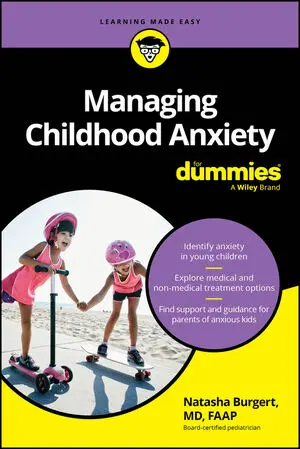Articles & Books From Emotional Health
Cheat Sheet / Updated 07-21-2025
Anxiety is a feeling that is rooted in the emotion of fear. Anxiety is protective, necessary, and part of being a human. But when worries and fears become all-consuming or irrational, anxiety has the power to pull children away from the things they love and want to do. If this happens, normal anxiety becomes an anxiety disorder.
Understand what child anxiety is, how to treat it, and how to support and encourage anxious children Anxiety is the most common mental health condition in young children. Managing Childhood Anxiety For Dummies is the go-to resource for parents of young children who suspect their child may be experiencing anxiety but aren't sure where to start.
Break free from social anxiety, one step at a time Feeling anxious around people? Not sure where to start? Then this user-friendly, practical resource might be exactly what you’re looking for. This workbook helps you tackle your fear of judgment and worry about what others think of you. You’ll find simple step-by-step instructions, worksheets and real-world examples to help you gain insight and control over your social anxiety.
Cheat Sheet / Updated 02-10-2025
Social anxiety affects the way you think and feel about yourself. You may worry that if you show symptoms of anxiety, you could be negatively evaluated, humiliated, or embarrassed and seen as being socially awkward. For some people, but not everyone, it can lead to lowered self-esteem, social isolation, loneliness, and depression.
Cheat Sheet / Updated 11-13-2024
The coping strategies or, resourcingskills, that you practice are essential for EMDR to be successful. Even outside of EMDR, these skills are foundational to helping yourself regain control of your mind and tap into living the life you want to create. Research shows that the more you practice and engage in healthy coping/resourcing skills, the more regulated and content you will feel.
The Breakthrough Therapy for Overcoming Anxiety, Stress, and Trauma EMDR (Eye Movement Desensitization and Reprocessing) is now recognized as one of the most effective treatment modalities for trauma, PTSD, anxiety, depression, addiction, and beyond. EMDR For Dummies is a user-friendly guide for patients who need an introduction to what this type of therapy can do for them—hint: it can help a lot.
Learn how to create healthy personal and relationship boundaries Boundaries are limits we establish for ourselves and implement through action or communication. Personal Boundaries For Dummies gives you all the basics on what boundaries look like (spoiler: they aren't "one-size-fits-all”), along with step-by-step instructions for figuring out what your boundaries are and communicating them with others.
Cheat Sheet / Updated 04-30-2024
There’s a lot to know about personal boundaries. But that doesn’t mean you need to wait until you understand all there is to know before you get started.The following are simple, actionable tips to help you start setting boundaries, along with specific actions you can put into practice immediately for some quick, powerful wins that instantly improve your boundaries.
Cheat Sheet / Updated 04-12-2024
Tips for chasing away feelings of lonelinessEverybody feels lonely at times. When it happens, it’s good to have strategies in mind to help you thwart the feeling and keep it from growing into a more chronic issue. Here are just a few suggestions you can try. Be kind to yourself. Opening up to others can be tough.
Combat the rising epidemic of loneliness with trustworthy information and advice Loneliness for Dummies helps readers understand loneliness and how to take steps to overcome this unwanted feeling. At some point in life, loneliness affects everyone. It can be triggered by unusual situations and events like children leaving home, losing a loved one, working remotely, moving, divorce, or retirement.







